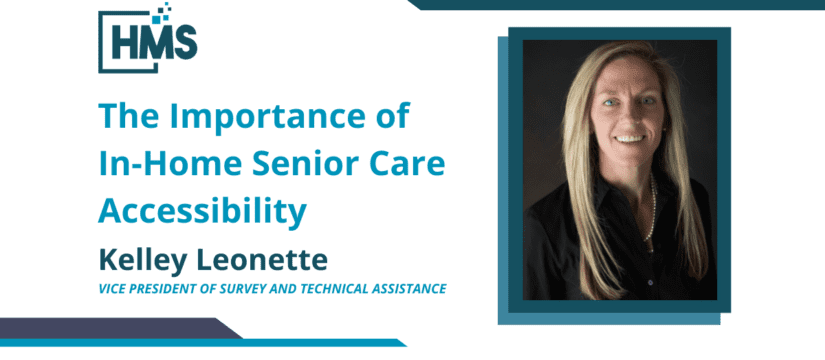
The Importance of In-Home Senior Care Accessibility
- February 3, 2022
- 2 Likes
- 1893 Views
- 0 Comments
How do you navigate the difficult decisions when determining how to care for a senior loved one? It’s not an easy task. There are often obstacles to caring for a loved one at home, including a lack of access to some resources. So, deciding between providing care at home versus choosing a long-term care facility can be extremely stressful.
In this video, Kelley Leonette, Vice President of Survey and Technical Assistance at Healthcare Management Solutions, LLC (HMS), weighs in on the importance of in-home senior care accessibility, discusses potential roadblocks that can arise when providing care, and offers insights into overcoming them.
How have in-home senior care services changed over the years?
Historically, Americans cared for their elderly parents and grandparents at home for as long as they possibly could. But over the past 50 or 60 years there’s been a trend toward older Americans moving into nursing homes, for a variety of reasons.
As a country, we need to look from an economic standpoint at why families may not be able to keep their loved ones at home, and explore how we can support families who prefer not to put their loved ones into long-term care facilities or hospitals in the final years of their life.
What prevents families from being able to keep their loved ones at home?
Finding and affording the things a loved one needs to remain in-home can be really difficult. Locating the right doctors and trained home-care aides, securing equipment such as oxygen and medical beds, plus managing medications and ensuring access to proper treatment, are all expensive and time-consuming challenges.
Societal changes in the U.S. have also complicated keeping loved ones at home. For one thing, the aging baby boomer population is very large, but the millennial generation is statistically smaller, so there have been fewer family members available to care for their elders. Younger family members often have to work outside the home and can’t be present as full-time caregivers.
And many families disperse as the children grow into adulthood, with family members living far apart and not able to provide the traditional type of home-care that was common a century ago. So, seniors end up going into assisted living, a nursing home, or other long-term care facilities.
What changes do we need to make so we can expand at-home care services for seniors?
We should expand Medicare to include more basic services for seniors at home. And we should simplify the process of qualifying for those services. The bureaucracy involved in qualifying for Medicare and Medicaid services can be a big roadblock for the people who really need them.
By expanding at-home services, we would also decrease the risk of future pandemics and reduce infection rates, because fewer people would reside in facilities. Nursing homes exist for a reason, and they provide an incredible service to elders and their families. But as a country, we need to think about whether a nursing home is always the right solution. Have we explored every option for enabling seniors to get the care they need at home for as long as they possibly can?
How can confidence in nursing homes be restored?
Regulators and quality-assurance organizations need to work collaboratively as partners to make sure nursing homes are safe places. As a society, we have to ensure that our loved ones are safe and satisfied in their care environment.
How does HMS play a role in helping government agencies improve quality care for seniors?
Through our survey work, HMS plays a major role in protecting vulnerable populations in nursing homes and other long-term care settings. We also provide technical assistance to state agencies, helping them improve a variety of organizational management processes, procedures, and data collection.
Our quality-assurance services truly impact elderly Americans and their families, who expect these facilities to provide whatever care they need. Our work helps restore consumers’ trust that facilities are being monitored, that their loved ones are being taken care of properly, and that they can rely on them for a high quality of care.

